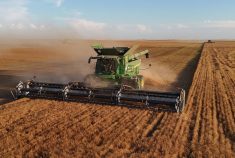Grain handler and agrifood firm Parrish and Heimbecker is close to putting shovels in the ground to replace its dry bean processing plant in southwestern Ontario.
The privately-held Winnipeg company announced in a release Tuesday it will spend an undisclosed sum to build what it calls a “multi-million-dollar food-grade facility” at Hensall, about 55 km north of London.
The company said its investment sends a “strong and supportive signal” to Ontario’s 2,000 navy bean producers.
The company’s current elevator at Hensall focuses on contracting and processing of dry beans and draws production from surrounding counties including Huron, Perth, Middlesex, Oxford and Bruce.
Read Also

Huge crops in South America says analyst
Although there’s a debate over the size of the South American soybean crop, there’s little doubt that it will be an enormous one, said consultant Michael Cordonnier of Soybean and Corn Advisor in Hinsdale, Ill.
P+H sells seed at Hensall and, using electric-eye sorting equipment, it also receives, processes, packages and ships navy beans, cranberry beans, black turtle beans and kidney beans.
The region’s soils yield “some of the best yielding and highest-quality dry beans in the world,” the company said.
The existing facility includes 17,256 tonnes of storage capacity and a 25-car rail spot, served by a RailAmerica shortline, the Goderich–Exeter Railway.
The company said Tuesday its project development plans indicate “groundbreaking is imminent” for the new plant. P+H’s eastern Canadian grain operations director Robert Bryson describes the development as a “world-class bean processing facility.”
“Footprint”
From a design standpoint, he said in the company’s release, the plans for the new plant have “thoroughly addressed the most stringent requirements from sustainability, efficiency and food safety perspectives.”
The design “has been modeled to exceed typical food quality standards through HACCP certification and rigid product identity preservation, thereby offering traceability from ‘farm to plate,'” the company said.
The plant’s location means it will be able to “exploit supply chain advantages, delivering freight savings to the end-use customer,” the company added.
Specifically, Bryson said, “a footprint in Hensall enables our customers to exploit transportation opportunities as they arise.”
The company, he said, can move product between rail and truck modes and ship in both packaged and bulk product, so the region’s marine gateway ports can be “used to their fullest potential.”
The new plant will also offer a “high degree of automation (that) allows us to operate more efficiently, with monitoring processes that will reduce errors, saving our customers time and money,” he said.















